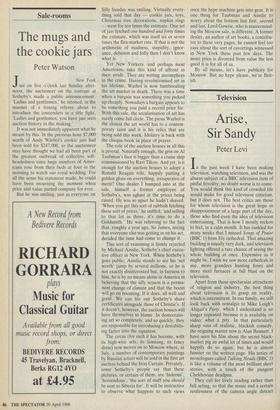Sale-rooms
The mugs and the cookie jars
Peter Watson
ust on five o'clock last Sunday after- noon, the auctioneer on the rostrum at Sotheby's made a public announcement. 'Ladies and gentlemen,' he intoned, in the manner of a boxing referee about to introduce the contenders in a title fight, 'Ladies and gentlemen, you have just seen auction history in the making.'
It was not immediately apparent what he meant by this. In the previous hour $7,000 worth of Andy Warhol's cookie jars had been sold for $247,000, so the auctioneer may have thought we had all been part of the greatest outbreak of collective soft- headedness since huge numbers of Amer- icans rose from their beds at four in the morning to watch our royal wedding. For all the sense his statement made, he could have been mourning the moment when price and value parted company for ever.
But he was smiling, just as everyone on
Silly Sunday was smiling. Virtually every- thing sold that day — cookie jars, toys, Christmas tree decorations, napkin rings — went for ten times the estimate. One set of jars fetched one hundred and forty times the estimate, which was itself six or seven times the flea-market rate. If that is not the arithmetic of madness, stupidity, ignor- ance, delusion and folly then I don't know what is.
Yet New Yorkers, and perhaps most Americans, take this kind of affront in their stride. They are witting accomplices in the crime. Having revolutionised art in his lifetime, Warhol is now bamboozling the art market in death. There was a time when a bargain was something you picked up cheaply. Nowadays a bargain appears to be something you paid a record price for. With this sale, the secularisation of art has surely come full circle. The pious Warhol is the closest the art world has to a contem- porary saint and it is his relics that are being sold this week. Idolatry is back with the cheque-book in place of prayer.
The role of the auction houses in all this is pivotal. Naturally enough, the grin on Al Taubman's face is bigger than a cruise ship commissioned by Ravi Tikoo. And yet, is it enough for the auction houses to adopt a Ronald Reagan role, happily putting A golden gloss on everything, irrespective, of merit? One dealer I bumped into at the sale, himself a former employee of Sotheby's, was aghast at the prices being raised. He was so upset he hadn't shaved. 'When you get this sort of rubbish fetching these sort of prices,' he sniffed, 'and selling to that lot in there, it's time to do a Goldsmith.' He was referring to the fact that, roughly a year ago, Sir James, seeing that everyone else was getting in on his act, decided the time had come to change it. .
This sort of reasoning is firmly rejected by Michael Ainslie, Sotheby's chief execu- tive officer in New York. When Sotheby's goes public, Ainslie stands to see his 'net worth' jump by several millions, so he is not exactly disinterested but, in fairness to him, he is by no means alone in America in believing that the silly season is a perma- nent change of climate and that the boom will go on booming. If it does, all well and good. We can file our Sotheby's share certificates alongside those of Christie's. If it doesn't, however, the auction houses will have themselves to blame. In democratis- ing art so completely, and so quickly, they are responsible for introducing a destabilis- ing factor into the equation.
The circus (for such it has become, with its high-wire acts, its lionising, its fancy dress) now moves on to Moscow where, in July, a number of contemporary paintings by Russian artists will be sold in the first art auction behind the Iron Curtain. Privately, some Sotheby's people say that these pictures, or certain of them, are 'hideous', 'horrendous', 'the sort of stuff you should be sent to Siberia for'. It will be instructive to observe what happens to such views
once the hype machine gets into gear. It is one thing for Taubman and Ainslie to worry about the bottom line first, second and last. Lord Gowrie, who is mastermind- ing the Moscow sale, is different. A former dealer, an author of art books, a contribu- tor to these very pages, he cannot feel too easy about the sort of cavortings witnessed in New York these past few days. The more price is divorced from value the less good it is for all of us.
By all means, let's have publicity for Moscow. But no hype please, we're Brit- ish.


























































 Previous page
Previous page